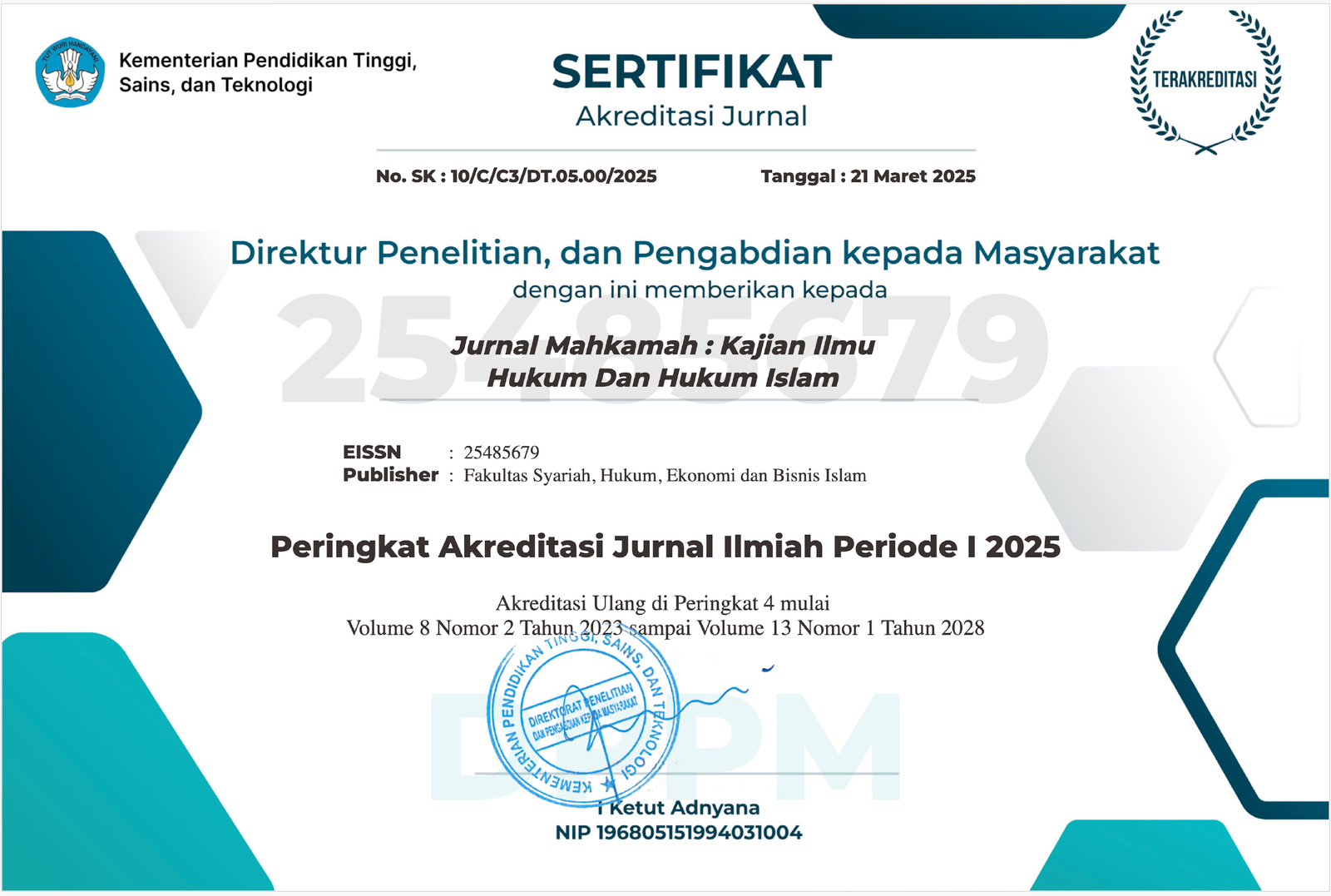Mediation Procedure in Religious Courts in Indonesia in the Perspective of Thought Wahbah Al-Zuhaily
DOI:
https://doi.org/10.25217/jm.v8i1.3486Keywords:
Divorce, Mediation, Mediator, Relegious Court, Wahbah Al-ZuhailyAbstract
Marriage is expected to be harmonious and happy. However, there are still many domestic disputes that end in divorce. Divorce cases in Indonesia are still very high. Divorce has many negative effects. Efforts to maintain the integrity of the household is necessary. One of them is mediation. This study aims to find out how the mediation procedure at the Religious Courts in Indonesia is in the perspective of Wahbah Al-Zuhaily's thought? Research conducted by the author using a type of library research (Library Research). While the approach is descriptive analysis; in this case describing and explaining conceptual phenomena. Literature study with main sources At-Tafsir al-Munir fi al-qidah wa al-Syari'at wa al-Manhaj and al-Fiqh al-Islamy Wa Adillatuhu by Wahbah al-Zuhaily and Supreme Court Regulation No. 1 of 2016 governing procedures mediation in court. From the research that has been conducted by researchers, it can be concluded that there are some similarities between the mediation procedures that apply to the Religious Courts in Indonesia and Wahbah al-Zuhaily's views in terms of the importance of mediation in efforts to reconcile disputes and disputes that occur between husband and wife. Likewise, in the main principles of mediation, mediation procedures at the Religious Courts in Indonesia are in line with Wahbah al-Zuhaily's thoughts. As in the qualifications of the judge or mediator and the limits of his authority in conducting mediation. Hopefully this research will bring benefits both theoretically and practically to all interested parties.
References
Abbas, Syahrial. (2011). Mediation in Sharia Law, Customary Law, and National Law. Jakarta: Kencana.
Abu Daud, Sulaiman bin Al Ash'ats. (2003). Sunan Abi Dawud. Riyadh: Maktabah Al-Ma'arif Li An-Nasyr wa At Tauzi'.
Adly, Fayizah. (2011). Al-Ishlah Fi al-Qur'an, Dirasah Maudhu'iyyah. Algeria: University of Al-Jazair, Faculty of Islamic Sciences.
Al-Hayli, Ra'd Kamil. (2004). Solving Family Disputes According to the Qur'an and Sunnah, Yogyakarta: Mitra Pustaka.
Al-Hakim, Abu Abdillah. (1990). Al-Mustadrak 'Ala As-Shohihaini. Beirut: Lebanon, Darul Pole Al-Islamiyyah.
Al-Hasany, Islamil. (2017). Mafhum al-Ishlah fi Al-Qur'an Al-Karim, Dirasah Fi Asbaabihi wa Madhaahirihi. USA: Al-Ma'had Al-'Alamy Lil Fikri al Islamy.
Al-Juzairy, Abdul Al-Rahman. (1976). Al-Fiqh `ala Madzahib Al-Arba`ah, Egypt: Dar Al-Nadhah Al-`Arabiyyah.
Al-Maliki, Sayyid, Muhammad bin Alwi. (2002). Adaabul Islam Fi Nizhamil Usrah. Mecca: Maktabah Al-Malik Fahd.
Al-Lahham, Badi' As-Sayyid. (2001). Wahbah al-Zuhaily Al-'Alim Al-Faqih Al-Mufassir. Damascus: Dar Al-Qalam.
Al-Qurtubi, Abi Abdillah, Muhammad bin Ahmad. (2006). Al-Jam'I Li Ahkamil Qur'an Wa al Mubayyin limā Tadlammanah min al-Sunnah wa Āy al-Furqan. Beirut: Muassasah al-Risalah.
Al-Sayis, Ali. (1992). Interpretation of Verses al-Ahkam, Cairo: Dar Pole Al-Tsaqofah, 1992.
Al-Tabari, Abu Ja'far Muhammad bin Jarir. (2006). Jami'ul Bayan 'An Ta'wil al-Quran. Riyad: Dar Hijr.
Al-Zuhaily, Mustafa, Wahbah. (1985). Al-Fiqh al Islamy Wa Adillatuhu. Damascus, Dar Al-Fikr.
Ali, Ahmed. (2004). Sosiologi Hukum; Kajian Empiris Terhadap Pengadilan. Jakarta: Iblam Publisher.
Arnus, Muhammad Mahmud. (1987). Tarikh Al-Qadha Fi al Islam. Cairo: Mathba'ah al-Mishriyah al-Haditsah.
Fuady, Munir. 2000. Arbitrase Nasional Alternatif Penyelesaian Sengketa Bisnis. Bandung: PT Citra Aditya Bakti, Cet, 1st
Ibn Kathir, Abi al-Fida Ismail bin Umar. Tafsir Al-Qur'an Al-Azim. Beirut: Dar Ibn Hazm.
Ibn Qudamah al-Maqdisi, Abdullah bin Ahmad. (1405 H). Al-Mughni fî Fiqh al-Imâm Ahmad bin Hanbal al-Syaibani. Beirut: Dâr al-Fikr
Ja'far, Abdul Ghofur, Mahmud Mustofa. (2007). At-Tafsir wal Mufassiruun Fi Tsaubihi al-Jadid, Egypt: Dar Aassalam.
Muhsin, Mahfudz. (2010). Konstruksi Tafsir Abad 20 M/14 H; Kasus Tafsir al-Munir Karya Wahbah Al-Zuhaily. dalam Jurnal al-Fikr, vol. 14, no. 1.
Mukti, Arto. (2012). Peradilan Agama dalam Sistem Ketata-negaraan Indonesia. Yogyakarta: Pustaka Pelajar.
Musahadi. (2007). Mediasi dan Solusi Konflik di Indonesia. Semarang: Walisongo Mediation Center.
Mushtofa al-Khin et al. (2012). al-Fiqh al-Manhaji ala Madzhab Al-Shafi'i. Damascus: Dar al-Falah.
Rusdy, Bassam et al. (2002). Al-Mausu'ah Al-Qur'aniyyah al-Muyassaroh. Damascus: Dar al-Fikr.
Salman, (2020). Implementation Of Mediation and Hakam in Divorce Case in Religious Court. https://journal.uinsgd.ac.id/index.php/ijni/article/view/12407/pdf.
Shalabi, Ahmad. (1978). At-Tarbiyah Al-Islamiyyah, Nazmuha Falsafatuha Tarikhuha, Egypt: Jami'atu Al-Azhar.
Zed, Mestika. (2004). Metode Penelitian Kepustakaan. Jakarta: Yayasan Obor Indonesia.
Peraturan Mahkamah Agung Republik Indonesia No 1 Tahun 2008 Tentang Prosedur Mediasi di Pengadilan.
Peraturan Mahkamah Agung Republik Indonesia No 1 Tahun 2016 Tentang Prosedur Mediasi di Pengadilan
Downloads
Published
How to Cite
Issue
Section
License
Copyright (c) 2023 Pahruroji Suhastra

This work is licensed under a Creative Commons Attribution-ShareAlike 4.0 International License.
This work is licensed under a Creative Commons Attribution-ShareAlike 4.0 International License.
Authors retain copyright and grant the Jurnal Mahkamah : Kajian Ilmu Hukum Dan Hukum Islam right of first publication with the work simultaneously licensed under a Creative Commons Attribution License (CC BY-SA 4.0) that allows others to share (copy and redistribute the material in any medium or format) and adapt (remix, transform, and build upon the material) the work for any purpose, even commercially with an acknowledgment of the work's authorship and initial publication in Jurnal Mahkamah : Kajian Ilmu Hukum Dan Hukum Islam.
Authors are able to enter into separate, additional contractual arrangements for the non-exclusive distribution of the journal's published version of the work (e.g., post it to an institutional repository or publish it in a book), with an acknowledgment of its initial publication in Jurnal Mahkamah : Kajian Ilmu Hukum Dan Hukum Islam.
Authors are permitted and encouraged to post their work online (e.g., in institutional repositories or on their website) prior to and during the submission process, as it can lead to productive exchanges, as well as earlier and greater citation of published work (See The Effect of Open Access).









